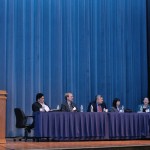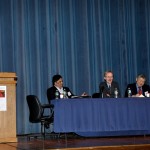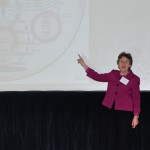The 2013 Food Law & Policy Conference, “Local Food || Global Food: Do We Have What It Takes To Reinvent the U.S. Food System?,” was hosted by the Maine Law Review this past Saturday, February 23rd. The event drew roughly a hundred attendees comprised of attorneys, law students, farmers, advocates, and interested citizens from Maine and beyond.
The conference brought together a diverse mix of topics and voices. Fifteen legal scholars from all over the country—New Hampshire, Vermont, Connecticut, Ohio, Nevada, Indiana, Idaho, Arkansas, Florida, California, and Oregon—tackled a spectrum of food issues. Among the topics covered: obesity prevention, global fisheries subsidies, farmland succession models, right to know issues, food sovereignty movements, and more. Even the First Amendment right to free speech was a point of discussion.
The wide range of emerging issues in food law and policy were loosely organized around three broad themes:
(1) The problems with the current federal approach to food regulation, especially to consumer safety;
(2) The legality of so-called food sovereignty and food choice movements; and
(3) How governments should respond to important emerging food trends.
The panel discussions were moderated by Maine Law professors Rita Heimes, Sarah Schindler, and Dave Owen, and included robust and insightful audience question-and-answer sessions.
A delicious, locally-sourced lunch was provided by Rosemont Market & Bakery, spotlighting ingredients from Maine farms and producers, including Fishbowl Farm, Sunset Acres Farm, Nature’s Circle Farm, Belanger & Sons, Freedom Farm, Sunset Farms, Rave’s Mustard, Kate’s Butter, Maine Grains, and VitaminSea Seaweed.
To emphasize the unmet need of access to healthful food in our own community, the conference spotlighted Cultivating Community, a nonprofit in Portland, Maine, that establishes urban and school gardens to implement its three-part mission of hunger prevention, youth and community development, and environmental modeling. Donations from sponsors and attendees collected during the conference will be passed on to Cultivating Community.
In many respects, the conference was a continuation of a conversation that people in Maine have carried on for many years—in academia, in the legislature, in town halls, and, of course, around the dining room table:
Where are we headed—as a state, as a region, and as a nation—when it comes to the production, processing, distribution, and consumption of food? Is this where we want to go? And do we have the right tools in the law and policy toolbox to get us there?
The conference reinforced that Maine is a place where people challenge conventional thinking, and test out new approaches—both outside and inside of the courthouse—with respect to food law, policy, and culture.
It also highlighted that, while many legal and policy challenges face Maine farmers and fishermen and there exists room for much improvement in the state’s food system, Maine is nonetheless well-positioned to be a national leader in developing a food system founded on locally grown and sustainably produced food, both from the land and from the sea.
The spring volume of the Maine Law Review, to be published in mid-May, will include academic essays on the food topics discussed during the conference.
Photo Credits: Tomasz Borkowski
The 2013 Food Law Conference was made possible by the generous sponsorship of:
Rosemont Market & Bakery
Sourcing local, seasonal foods so you can eat consciously, slowly, pleasurably, and well.
Coffee By Design
Handcrafted micro roasted coffee.
East End Cupcakes
Better than the cupcakes you remember.
Kamasouptra
Steamy. Hot. Soup.
LiveME | Maine-Inspired Apparel & Accessories
Proudly proclaim your love for Maine and some of its most cherished activities.
Maine Farmland Trust
www.mainefarmlandtrust.org
Pierce Atwood LLP
www.pierceatwood.com
The Student Bar Association
University of Maine School of Law
Thank You.













